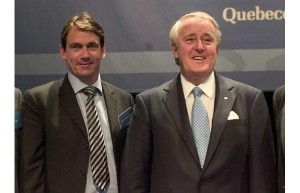Re Ian Bremmer 'Could third-party candidates upend the 2024 US election?' 3 April The current political movement in the USA…
PQ post 2014 Quebec elections
Written by Diana Thebaud Nicholson // September 9, 2017 // Québec // Comments Off on PQ post 2014 Quebec elections
‘English is the key’: Controversy in Quebec as more francophones choose English CEGEPs
Parti Québécois delegates will debate and possibly vote on resolution to cut funding to English CEGEPs
‘United’ after Lisée’s leadership test, Parti Québécois sets sights on upcoming election
PQ leader’s 92.8% result in confidence vote comes 13 months ahead of next provincial election
2016
18 December
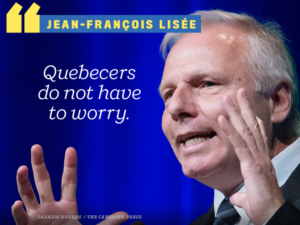 When I say no referendum, that’s a promise, says PQ leader Jean-François Lisée
When I say no referendum, that’s a promise, says PQ leader Jean-François Lisée
It was a joke Jean-François Lisée couldn’t resist, given the Parti Québécois’ tumultuous past and history of internal bickering.
“All I can say is that now that I am leader, out with the old squabbles, in with the new ones,” he quipped during an end of session news conference in December.
“And we have a convention coming up, so I am promising you fresh squabbles there.”
The PQ’s internal problems are often the subject of mirth in the media and other political parties, but there has been quite the turnaround since Lisée took over the party from Pierre Karl Péladeau Oct. 8.
If he has accomplished one thing, it has been to cement the normally fractious caucus and party that made life hellish for previous leaders.
In the old Marois government Lisée was the minister responsible for anglophone issues. He notes it was the PQ, specifically Péladeau and Lac-Saint-Jean MNA Alexandre Cloutier who went to bat to fight the Liberal government’s attempt to wrest control of hospitals and school boards from the anglophone community.
“I have skin in the game already,” said Lisée.
During the leadership race, Lisée pledged to again name a minister for anglophone issues, something Premier Philippe Couillard ruled out again just before Christmas.
And he says he wants to expand the PQ base in Montreal adding the other opposition party, the Coalition Avenir Québec is not even trying.
“I told my anglo (politician) friends that (they) had been too weak in defending anglo holds on hospitals and if, as a premier, I can reverse some of that I will,” Lisée said.
Lisée says he thinks he’s making headway with minorities, which traditionally stick with the Liberals out of fear of sovereignty.
14 October
New PQ leader announces shadow cabinet, says he’ll rethink his position on religious symbols
(Montreal Gazette) He began the reconciliation process by inviting runner-up Alexandre Cloutier to dinner Thursday night. Then on Friday, Lisée, announcing his shadow cabinet, said he granted Cloutier’s wish to return as education critic.
The unveiling of the shadow cabinet also came with news Lisée is trying to “re-balance” his position on identity, secularism and immigration.
Lisée was harshly criticized during the race for proposing, among other things, to take elements from the Charter of Quebec Values and ask that all civil servants refrain from wearing ostentatious religious symbols at work. He also said he would be willing to look at banning burkas in the province for security reasons, and suggested cutting the number of immigrants Quebec welcomes every year.
Now, Lisée said he is re-thinking those positions
Macpherson: Lucien Bouchard defends, criticizes Jean-François Lisée
Bouchard said Lévesque would have been “troubled” by the recent debates in the PQ on identity. Lévesque had an “unbreakable attachment” to minority rights, and would be “worried by any deviation related to identity … fearing the effect of the exclusion” that immigrants and their descendants would suffer as a result. Bouchard didn’t name Lisée, but his remarks were obviously aimed at the new PQ leader, who had taken the hardest position on immigration and other issues related to identity during the leadership campaign.
9 October
Jean-François Lisée brings identity politics back to Parti Québécois
(Globe & Mail) A shrewd and charismatic political tactician who has spent most of his working life as an adviser and critic will now lead the latest attempted renaissance of the Parti Québécois.
Jean-François Lisée, a journalist, intellectual and key confident of Jacques Parizeau in the 1995 referendum on Quebec sovereignty, won the PQ leadership Friday on a second ballot. He upended youthful frontrunner Alexandre Cloutier by returning to the identity politics many in the PQ had rejected after their 2014 election defeat.
Mr. Cloutier and Mr. Lisée himself were among those who had declared the party was on the wrong path with the so-called charter of values that would have banned religious symbols such as the Muslim veil from public-sector workplaces. In his leadership campaign, Mr. Lisée veered back into identity politics, proposing a reduction in immigration levels in the province and launching a debate on whether to ban the burka in public.
OPINION: Lisée does the full Trump to sway PQ faithful
Premier Philippe Couillard tersely congratulated Mr. Lisée, 58, for his victory and then lambasted him and his party for turning away from a more inclusive vision of Quebec. The PQ is moving toward “a kind of nationalism of the besieged, nationalism of the fearful, of people who don’t want to deal with diversity, who prefer Quebec remains folded in on itself. That’s what we see elsewhere in the world,” said Mr. Couillard, who was on a trip to Iceland.
As in any leadership campaign, Mr. Lisée will also have internal divisions to heal – not an obvious strong suit for a man often described as arrogant and Machiavellian even among his admirers. During the campaign, Mr. Lisée darkly suggested Mr. Cloutier had the support of Muslim activist and provocateur Adil Charkaoui.
In his first speech and press conference as PQ Leader, Mr. Lisée made little mention of his wish to limit immigration or the measures he would take to enforce a secular vision of Quebec society. He did promise to reach out to Mr. Cloutier, whose failed campaign had a more inclusive vision.
7 October
Jean-François Lisée elected leader of Parti Québécois
There will be no Quebec sovereignty referendum for at least another six years if the new Parti Quebecois leader becomes premier in 2018 and stays true to his promise.
Jean-Francois Lisee, 58, was elected PQ leader Friday, winning more than 50 per cent of support on the second round of voting.
Lisee, a one-time adviser to former premiers Jacques Parizeau and Lucien Bouchard, said during the leadership campaign he would not hold a referendum in his first mandate as premier. The next election will be held in the fall of 2018, with the following one set for 2022.
11 September
Martin Patriquin: The PQ’s biggest threat? Itself.
As the Parti Québécois looks for a new leader, even long-time separatists are wary of independence talk
Normally, there is a cleansing aspect to a political leadership race. Coming in the wake of bruising defeat, it allows a party to make a show of taking stock, seeking out new blood and renewing policy. This mixture of humility and self-confidence is usually good media fodder, crucial for a party to stay relevant through the lean years in opposition.
In this sense, the current Parti Québécois leadership race is lacking on several fronts. There was no recent crushing defeat — that came more than two years ago, when Quebec’s main sovereignist party lost to the Liberals. Rather, the current race is to replace Pierre-Karl Péladeau, whose quick rise to the top of the party was matched only by his swift departure less than a year into the job.
Nor is there much new blood. Three of the four people vying to lead the PQ also ran in 2015. And beyond the rather batty notion, made by hard-left candidate Martine Ouellet, to nationalize Quebec’s Internet infrastructure, there is little policy renewal.
13 July
Jean-François Lisée backtracks after congratulating the Tenors for changing O Canada lyrics
Parti Québécois leadership candidate tweeted his support for group’s ‘all lives matter’ statement.
Following a flood of criticism, Lisée changed his tune within three hours and issued an apology.
29 May
Le PQ aura un nouveau chef le 7 octobre
(Radio Canada) Réunis en assemblée, les présidents des instances du Parti québécois (PQ) ont adopté les règles de la course à la direction de la formation politique. Le prochain chef du Parti québécois sera désigné le 7 octobre prochain.
Le scrutin pour désigner le successeur de Pierre Karl Péladeau, qui a démissionné au début du mois, aura lieu du 5 au 7 octobre, par vote électronique préférentiel.
Chaque candidat devra recueillir 1500 signatures et débourser 20 000 $. Le plafond des dépenses par candidat est fixé à 200 000 $, soit la moitié de la dernière course.
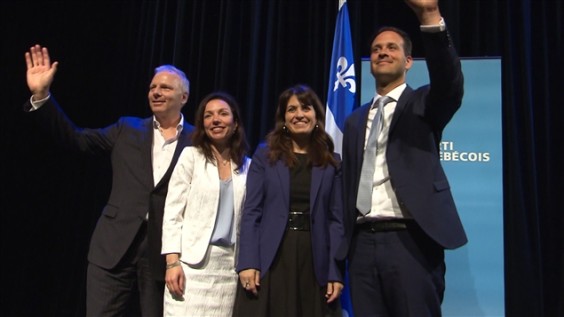
Celine Cooper: Brexit vote could reverberate in Quebec
… the outcome of June’s referendum — particularly the impact on Scotland of a U.K. decision to leave the EU — could have a direct impact on the political landscape in Quebec, especially given that the Parti Québécois is currently into another cycle of leadership campaigning.
27 May
PQ leadership candidate Martine Ouellet says Quebec urgently needs to separate from Canada
Pierre Karl Péladeau would have set in motion a referendum on Quebec independence within a first mandate of a Parti Québécois government, leadership candidate Martine Ouellet said Friday kicking off her own campaign.
Trying to shore up her own hardline sovereignty option by linking her campaign to that of the popular former leader, Ouellet said in her mind 70 per cent of the PQ members in the 2015 leadership race voted in favour of the party achieving independence in a first mandate of government.
While the other candidates Alexandre Cloutier and Véronique Hivon are pussyfooting around the referendum-sovereignty issue, and with candidate Jean-François Lisée pushing good government and no referendum, she said she will be clear from the get-go.
The PQ will pick its new leader sometime this fall. PQ riding presidents are meeting Sunday in Drummondville to rubber stamp the rules of the leadership race.
3 May
The PQ’s brush with Pierre Karl Péladeau cost the party dearly
The party lost 24 MNAs, it’s deep in debt and its brand is bruised. And now it needs a new leader.
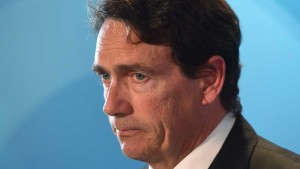 Pierre Karl Péladeau et les raisons familiales
Pierre Karl Péladeau et les raisons familiales
(L’actualité) Est-ce que sa famille est la seule raison de son départ? Lorsqu’on connait le parcours personnel de Pierre Karl Péladeau, il est plausible que ses enfants soient au coeur de sa décision.
En écrivant le grand portrait de Pierre Karl Péladeau et de la course au leadership au PQ, publié dans le magazine en juin dernier, il est rapidement devenu évident que la relation avec son père, Pierre Péladeau, puis avec ses enfants, explique une bonne partie de sa personnalité et de ses comportements.
La démission-surprise de Pierre Karl Péladeau
Le caucus péquiste aurait appris la nouvelle 10 minutes avant la conférence de presse. «On est tous soufflés», révèle une source.
«J’ai choisi ma famille.»
La décision de Pierre Karl Péladeau n’était pas réfléchie. Selon nos informations, PKP l’aurait prise dimanche à la suite d’une discussion avec Julie Snyder au sujet de la garde de ses enfants.
«Aujourd’hui, je suis devant une absence d’alternative qui me force à faire un choix entre ma famille et mon projet politique», a-t-il déclaré lundi en conférence de presse.
Julie Snyder on Pierre Karl Péladeau, marriage and politics
Interview with prominent Quebec host aired day before Péladeau quit as Parti Québécois leader
PKP: Farewell to the PQ’s last-chance man
Paul Wells on Pierre Karl Péladeau’s historically short, ill-suited leadership of the Parti Québécois, and what comes next
No elected PQ leader served a shorter time than Péladeau. No elected leader in the party’s history (I’m keeping the distinction between elected and interim leaders) quit before his first general election campaign. Péladeau’s speed record is healthy for the party: His short temper, inept public-speaking style, chaotic office management, delight in collecting and prosecuting grudges, cruelly faulty understanding of Quebec history and politics, spectacularly limited attention span and tabloid-fodder family life made him one of the most ill-suited party leaders I have ever seen in any party in any jurisdiction. The PQ is well rid of him.
I’m not sure what will become of the Institute for Sovereignty Péladeau wanted to set up, on his own dime, to churn out studies designed to prove that Quebec would be better off outside Confederation. I’m not sure who’ll replace Péladeau. Former broadcaster Bernard Drainville, perhaps, whose Charter of Quebec Values helped drive the PQ to spectacular defeat in 2014. Author and former journalist Jean-François Lisée, perhaps, though he seems to have established himself in a brief attempt to compete against Péladeau as every anglophone’s favourite Péquiste. There are young candidates, including Alexandre Cloutier, a former Supreme Court of Canada law clerk who was intergovernmental affairs minister under Pauline Marois.
Pierre Karl Péladeau exits politics just as he arrived: hastily. Martin Patriquin on the former Parti Québécois leader’s surprise resignation
Like most politicians beating a hasty retreat from politics, he chose family. By his own logic, his dreams for his children will suffer as a result.
25 January
Pierre Karl Péladeau calls report linking Quebecor, tax havens ‘big dud’
Radio-Canada reports 30 companies and subsidiaries with ties to Quebecor found in Barbados, Cayman Islands
Enquête, Radio-Canada’s investigative program, found about 30 companies and branches that seem to have a link with Quebecor which were active in a dozen countries known to be tax havens.
Many of the subsidiaries were active while Péladeau was president of the company.
— Quebecor companies registered in Delaware prompt questions
— Pierre-Karl Péladeau targeted by opponents in PQ leadership debate
24 January
Pierre Karl Péladeau, Québecor et les paradis fiscaux
(ici Radio Canada) Il n’y a pas que la Suisse, le Luxembourg et l’Islande qui auraient accueilli des compagnies ayant un lien avec Québecor. Selon les informations obtenues par l’émission Enquête, plusieurs compagnies ou succursales qui semblent avoir un lien avec l’entreprise québécoise auraient été actives dans une dizaine de paradis fiscaux; un grand nombre d’entre elles pendant la présidence de Pierre Karl Péladeau.
20 January
Parti Québécois caucus meeting off to rocky start for Pierre Karl Péladeau
PQ MNAs in Saguenay for two-day retreat
1 January
Martin Patriquin: Pierre Karl Péladeau won’t be a Parti Québécois saviour
Pierre Karl Péladeau is not going to ignite the PQ. He is about to fall into some familiar political traps.
As a party with the singular goal of getting Quebec out of Canada, the Parti Québécois has long been affected by what might be called the Saviour Syndrome. Its leaders have typically been propelled to the helm of the sovereignist party by the promise of being Quebec’s founding president, only to tumble into the maw of party infighting when the dream goes unrealized. Current PQ Leader Pierre Karl Péladeau is fast figuring out just how thankless a job it can be. Barely seven months in, he is contending with a disgruntled caucus, a restive base and underwhelming poll numbers. It promises to be a difficult year ahead.
2015
24 November
Pierre Karl Péladeau admits misstep at PQ meeting
Pierre Karl Péladeau conceded Tuesday that he still has things to learn about the business of being a politician.
Péladeau agreed he was not clear enough Sunday when he was asked — twice — to explain his views on the partition issue sparked by the presence of First Nations leader Ghislain Picard at a Parti Québécois national council meeting in Sherbrooke.
This time he said what he did not say Sunday: that a sovereign Quebec would keep its existing borders.
“It’s clear I don’t have the political experience of many MNAs,” Péladeau told reporters as questions about his leadership and knowledge of the sovereignty plan swirled through the halls of the legislature.
4 June
The glorious failure of Jacques Parizeau
Anne Lagacé Dowson
(iPolitics) With Camille Laurin — the author of Law 101, Québec’s language law — and René Lévesque, the populist leader of the movement, Parizeau had a hand in creating almost all of the levers of modern Québec. This list is long: Hydro-Québec, the provincial pension fund manager called the Caisse de Dépôt et Placement, the union investment fund Fonds de Solidarité, and the province’s modern public service. He was a feared minister of Finance and was acclaimed leader of the PQ after Lévesque stepped down.
Younger Quebeckers have no memory of Parizeau, but they’re getting a crash course in his life’s work and achievements now. The old Québec that produced him is long gone; no one played a larger role than he did in consigning it to the past.
27 May
The fun begins – or, more accurately, intensifies
PKP accuses Liberals of harassment over Videotron billing fees
The debate was triggered by PQ energy critic Bernard Drainville’s comment in the national assembly that the province’s hydro utility is usuriously charging people rates of 14.4 per cent for late payments.
Energy Minister Pierre Arcand responded by stating that Videotron, a subsidiary of Québecor Inc., charges its late-paying customers interest rates of 19.56 per cent.
22 May
Bravo Benoit Aubin! Sadly, some of the comments indicate that there’s still a long way to go to convince all Québécois de souche
Benoit Aubin: Le vrai Québec
(Journal de Montréal) À l’hôpital, sous l’influence homogénéisatrice des conventions collectives – et d’une mission commune –, un plus grand niveau d’intégration est évident. Une communauté s’est créée. J’ai entendu des Haïtiens et des Québécois se taquiner sur leurs accents, des Français s’expliquer des termes québécois entre eux, même une Française essayant de parler comme une Québécoise, l’envers de la médaille de la Québécoise qui «perle» en France…
Je ressors de l’hôpital – toujours heureux d’en sortir – en me disant que la bonne stratégie de survivance d’une société francophone en Amérique serait d’embrasser cette diversité, de harnacher son énergie, sa vitalité, pour construire quelque chose de nouveau et de viable ici.
Je me dis aussi que c’est bête de ne pas s’y appliquer, puisque nous n’avons pas le choix, la réalité étant ce qu’elle est…
Mais en entendant les péquistes revigorés par l’élection de PKP à leur tête se dire qu’il est urgent de «faire le pays» parce que, dans une génération, il sera «trop tard», je me demande, forcément, de quelle sorte de pays ils parlent au juste.
20 May
Lysiane Gagnon: It doesn’t matter if PKP can’t change
Only a few years ago, as he was ruthlessly crushing the journalists’ unions at his newspapers, he was advocating the repeal of the Rand formula – a radical policy that would instantly starve labour unions – and courting the Harper government and calling for budget cuts to the CBC.
Now, Mr. Péladeau has turned into a friend of Radio-Canada and a vibrant social democrat, who pledges to keep intact the sacred “Quebec model” and the PQ’s “progressive tradition.” To those who remind him of his recent past, he replies that, as a businessman, he had some responsibilities that do not apply now he is in politics – as if he was not still in business, too. Mr. Péladeau promised to let a blind trust run his media empire, with the enormous caveat that the administrators must not sell his holdings. Quebecor Inc.’s chairman, former prime minister Brian Mulroney, recently admitted the company consults Mr. Péladeau “once in a while” – it has to, he said, since Mr. Péladeau is the majority shareholder. The situation opens the door to massive conflicts of interest.
Mr. Péladeau is quite evasive about how he is going to fulfill his dream of making Quebec a country, a goal he says is his only reason for entering politics (he is not interested in running a provincial government, he says)
15 May
Quebec now gets its ‘PKP moment’: Péladeau elected leader of PQ
He described the result as an enormous vote of confidence, but the 43 per cent of votes that went to a weak field and the 20 per cent of members who did not vote illustrated the depth of divisions he must now try to heal.
14 May
Yves Boisvert: Péladeau closes in on victory singing an old-time song
On Friday evening, Pierre Karl Péladeau will most likely become the Parti Québécois’ eighth leader, and arguably the most radical of them all.
By the tone of his speeches and his Facebook posts, Mr. Péladeau sounds very much like an old-time nationalist raging against the federal government, “Anglo-Saxons” and immigration.
Once he becomes official leader of the opposition, he might tone down his rhetoric in an effort to appeal to a larger audience. But I fail to see how he plans to convert non-PQ members, especially the younger generation.
2 April
Yves Boisvert: With PKP, it has to be personal
Not so long ago, Mr. Péladeau was in a position where everyone in the boardroom said, “Yes, boss.” They found his jokes funny and his ideas brilliant. Now, he’s a moving target in a hostile environment, under attack even within his own party. Given his famous temper, some advice could prove useful.
After his faux pas on immigration, in which he said immigrants were costing the sovereignty movement “a riding a year,” and some social media ranting about journalistic “harassment” (such as a reporter’s call to his cellphone at 5 p.m.), Mr. Péladeau’s latest dust-up is with Claude Bisson, the respected jurisconsult for Quebec’s National Assembly.
9 February
Don Macpherson: Parti Québécois leadership campaign will expose Pierre Karl Péladeau’s weaknesses
… at the PQ council meeting, which featured speeches by the five candidates who qualified for the leadership election [,] The speaking order was determined by draw, and Péladeau was last. By himself, he is a poor public speaker. In comparison with the other candidates he followed, especially Bernard Drainville, who immediately preceded him, he sounded even worse. More important, Péladeau showed no improvement in the two months since he launched his campaign. Even though he would be speaking to an important audience, including PQ riding presidents and regional executives, he was the only candidate who did not prepare his speech. He sounded like a student who hadn’t studied for an oral exam, and he was rewarded with only lukewarm applause. Maybe this rich man’s heir doesn’t have to work to win the leadership, and all he needs are the media he owns and the unofficial campaign slogan with which he ends his speeches: “Pour faire du Québec un pays!” — To make Quebec a country. Maybe Jean-François Lisée was right when he withdrew his leadership candidacy, and Péladeau’s lead in popularity is insurmountable.
On the weekend, however, Péladeau looked anything but invincible. He looked as though he could be beaten, by himself.
7 February
Pierre Karl Péladeau crée un malaise durant un concert à Rouyn-Noranda
(La Presse) En présence de 200 spectateurs, le député péquiste de Saint-Jérôme a interpellé la chanteuse Sabrina Halde, du groupe québécois Groenland, qui chante en anglais, pour lui demander qu’elle s’adresse en français sur la scène de l’Agora des arts, le 29 janvier.
23 January
Jean-François Lisée withdraws from PQ leadership race
In YouTube video to supporters, Lisée said he believes PKP will win PQ leadership
With a handful of supporters behind him, Lisée made the announcement at a news conference Friday afternoon, saying that he believes fellow leadership candidate Pierre Karl Peladeau’s victory is a foregone conclusion.
“What’s the political reality?” Lisée asked. “We feel is he will be chief of the PQ so once you come to this conclusion, what’s the point? What’s the point of criticizing [and] having controversies?” … he had on several occasions voiced concerns over rival candidate Pierre Karl Péladeau’s majority shares in media conglomerate Quebecor.
2014
28 December
Celine Cooper: What impact would a Péladeau win have on the 2015 federal election?
… the new PQ leader will be chosen in May 2015. If Stephen Harper respects the fixed-date election law, Canadians will head to the polls a few months later, in October. If PKP wins — as many expect him to — there is a good chance that nationalist rhetoric could be ramped up during the campaign period. It’s the kind of discourse that could trickle over into the federal election, particularly if a backlash against the provincial Liberals’ heavy-handed austerity measures continues to grow.
Currently, the NDP owns the overwhelming majority of federal real estate in Quebec. Although the Liberals are leading the polls province-wide, they are lagging behind the NDP when it comes to support among francophones in Quebec. Part of the NDP’s success is because of their commitment to social-democratic ideology, but they also have worked to appeal to soft nationalists in the province. Meanwhile, the Conservatives are looking to regain ground in the Quebec City region. If nationalist rhetoric is on the uptick during the campaign, I’m interested to see how federal candidates navigate those waters.
3 December
LYSIANE GAGNON: Péladeau ignores the rules of politics
As the sole head of a huge family business, the man is used to having his way. He’s not used to being contradicted, and doesn’t much tolerate dissent. At Quebecor, he was known for his temper tantrums and his micromanaging habits. True to form, instead of relying on a speechwriter for the official launch of his campaign, he wrote his own remarks. (They were plodding and badly delivered.) This, in a party renowned for the eloquence of its spokespeople.
But when he speaks ad lib, he runs into another sort of problem. He’s prone to blunders, like the time he declared the Bloc Québécois useless and harmful for sovereignty. His comment raised such a storm within the sovereigntist movement that he had to backtrack the next day.
Instead of relying on advisers to polish his image, he jots down whatever crosses his mind on his Facebook page – a habit that sometimes makes him look ridiculous.
28 November

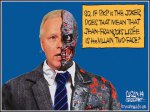
Independence will make Quebecers richer: Péladeau
Staking out a place in the hearts of Parti Québécois hardline members who will be voting in May on a new leader, Péladeau — a former businessman — has started to play the economic argument in his campaign.
It’s considered his strongest card with other candidates saying they are more concerned with issues of social justice or the need to renew the moribund sovereignty movement.
But Péladeau has again bobbed and wove around questions about the mechanics of a referendum, his timeline and how to actually achieve sovereignty.
Meanwhile, Premier Philippe Couillard has taken a first shot at Péladeau, wondering out loud “what planet is he living on” for saying Quebec’s financial crisis is not as bad as the government thinks.
27 November
Péladeau enters PQ leadership race, sovereignty his only goal
Péladeau confirmed what people had long been expecting when a university student asked him after a speech whether he was going to take the plunge.
When another student asked him what could motivate a rich man like him to want to become PQ leader, he repeated the dramatic phrase that marked his entry into politics last spring: “To make Quebec a country.”
The one difference this time was the absence of any fist pump to accompany the declaration.
21 November
Don Macpherson: Parti Québécois leadership and Pierre Karl Péladeau’s control of media access — and of himself
It’s about control. That’s what makes the incident concerning Pierre Karl Péladeau’s cellphone less trivial than it might appear.
It’s about how Péladeau, if he becomes Parti Québécois leader, might change the practice of politics in Quebec, by reducing the media’s control over its messages and agenda.
And it’s about Péladeau’s lack of control over himself.
A journalist for La Presse reported this week that Péladeau was “beside himself” because the reporter had called him on his personal cellphone to check a story. It’s a common practice in Quebec politics, but one to which Péladeau, a powerful businessman who is new to politics, is not accustomed.
Péladeau didn’t let the matter drop. The day the incident was reported, he asked the reporter publicly on Twitter to “stop harassing me” and “not to call me on my personal cellphone.” And the day after that, he told reporters at the National Assembly it is “unacceptable” for them to violate Assembly members’ “privacy” by calling them directly on their cellphones, instead of going through media-relations staff.
The incident fits a pattern of Péladeau, a media owner himself, avoiding the media to a degree unprecedented in Quebec politics. Previously, he had told reporters at the Assembly that he isn’t obliged to answer their questions. He doesn’t often give interviews, preferring to use Facebook to communicate directly without journalists selecting the questions to ask and the answers to report.
10 November
Pierre Karl Péladeau to seek PQ leadership
Media magnate Pierre Karl Péladeau will seek the Parti Québécois leadership and will likely announce it on Nov. 23, Radio-Canada reported Monday.
The French-language network said the controlling shareholder of Quebecor Inc. will make the announcement in his riding of Saint-Jerome.
The report said former premier Bernard Landry has offered to be with Péladeau for the occasion.
7 November
La FTQ ne veut pas de Pierre Karl Péladeau à tête du PQ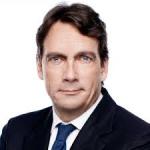
(HuffPost) La FTQ pourrait militer contre Pierre Karl Péladeau si ce dernier se lance dans la course à la direction du PQ. Son président Daniel Boyer, laisse même entendre que ses membres pourraient noyauter le parti pour bloquer une éventuelle candidature du député de Saint-Jérôme.
Fin novembre, les vices-présidents de la FTQ détermineront s’ils s’impliqueront ou non dans la course à la direction du PQ, a précisé M. Boyer lors d’une entrevue au 15-18 sur ICI Radio-Canada Première.
Cinq candidats briguent officiellement l’investiture du Parti québécois : les députés Jean-François Lisée, Bernard Drainville, Martine Ouellet et Alexandre Cloutier ainsi que le porte-parole du Conseil national des chômeurs et chômeuses, Pierre Céré. Premier dans les sondages et candidat pressenti, Pierre Karl Péladeau n’a toujours pas confirmé s’il sera ou non dans la course à la succession de Pauline Marois.
5 November
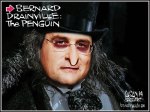 Drainville promet de libérer le Québec du pétrole
Drainville promet de libérer le Québec du pétrole
Bernard Drainville promet de «libérer le Québec du pétrole» en exploitant… ce même pétrole. Le candidat déclaré à la direction du Parti québécois propose d’utiliser les ressources exploitables de l’île d’Anticosti pour faire du Québec «la première économie sans pétrole et vraiment verte des Amériques». Devant une centaine d’étudiants réunis à l’Université de Montréal, il a détaillé certains éléments qu’il entend défendre durant la course.
Le plan vert de Bernard Drainville se base principalement sur le développement du transport électrique dans la province. Les profits générés par le pétrole d’Anticosti, s’il y en a, serviraient notamment à financer ces projets électriques.
31 October
 Jean-François Lisée se lance dans la course à la direction du PQ
Jean-François Lisée se lance dans la course à la direction du PQ
Radio-Canada a appris que Jean-François Lisée sera officiellement candidat à la direction du Parti québécois (PQ). Il ira chercher lundi son bulletin de candidature.
Ses dépenses électorales commenceront alors à être comptabilisées, mais il devra aussi franchir plusieurs autres étapes. D’abord il doit amasser 2000 signatures dans 50 circonscriptions de la province d’ici le 30 janvier 2015. Il devra aussi donner 10 000 $ en dépôt auprès du parti.
Selon nos informations M. Lisée pourrait aussi présenter certains de ses appuis en vue de cette course lundi.
L’ancien conseiller de Jacques Parizeau lancera par ailleurs son livre ce même jour, au lendemain de son apparition à l’émission Tout le monde en parle dimanche soir.
18 September
Don Macpherson: A Yes win in Scotland’s referendum wouldn’t help Quebec sovereignists
For the Quebec sovereignty movement, it has come to this: so bleak is the situation at home that it must look across the Atlantic Ocean for hope of revival.
The Scottish independence movement hasn’t wanted to be seen in public with the ethnic-nationalist, two-time referendum losers from Quebec, though it has sought the benefit of their experience in private, presumably to learn what not to do.
(What the sovereignists have learned is that it would help them if Quebec, like Scotland, had a lot of oil and gas money.)
And the Quebecers’ pilgrimages to Scotland for the independence referendum campaign and the vote on Thursday draw attention to the contrast between the two secessionist movements.
There, late-campaign polls showed the Yes side close to a majority, on a much more direct question (“Should Scotland be an independent country?”) than Quebec sovereignists dared to ask.
24 June
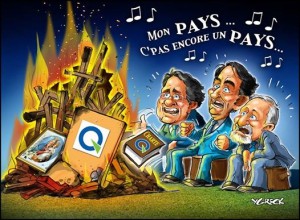 Chantal Hébert writes that the Fête Nationale [is] not the celebration the Parti Québécois wanted
Chantal Hébert writes that the Fête Nationale [is] not the celebration the Parti Québécois wanted
The sovereigntist movement is more unpopular than ever and the two parties with the most support are the NDP and Coalition Avenir Québec
Three months ago sovereigntist strategists believed a governing majority was at hand for premier Pauline Marois.
They expected Tuesday’s celebrations to mark the first opportunity in a decade to put the secession project back on track.
Instead the party is plumbing the depths of unpopularity.
The last published Quebec polls before the summer break show the PQ in third place, at 20 per cent, almost 10 points behind the Coalition Avenir Québec.
Support for sovereignty hovers between 31 per cent (Léger Marketing) and 36 per cent (CROP).
In short, the PQ is less popular than its raison d’être.
… Since the election, no unifying figure with the gravitas to move the party forward has emerged from within the movement’s ranks. Former Bloc Québécois leader Gilles Duceppe — who might have fit that bill — took himself out of the race last month.
Among those likely to run, the most prominent are media mogul Pierre-Karl Péladeau and former minister Bernard Drainville — and both are polarizing figures in their own right.
Drainville’s values charter drove almost as deep a wedge within the sovereignty movement as it did in Quebec at large.
As for Péladeau, his track record as a union-lockout champion would likely cost the party the support of its union and social democrat allies.
Pierre Karl Péladeau (left) and Brian Mulroney after the Québecor annual meeting in May 2004: According to a report in the Globe and Mail, Mulroney will be appointed chair of Québecor at its annual meeting June 19.
Photograph by: Dave Sidaway , GAZETTE file photo
Don Macpherson: Mulroney may not be the ideal federalist fig leaf for Péladeau
Through Québecor, Péladeau owns not only the province’s most-read daily, Le Journal de Montréal, but also the largest in Quebec City, and the province’s most popular television network, TVA.
And in media and political circles in Quebec, Péladeau has a reputation for directing their news coverage.
Attention was drawn again to Péladeau’s situation last week, when the Globe and Mail reported that former prime minister Brian Mulroney is to be appointed chair of Québecor at its annual meeting June 19.
Mulroney is to serve as a federalist frontman for the sovereignist Péladeau as Québecor seeks to expand its wireless business, which comes under federal regulation, in English Canada.
Even in Québecor’s Quebec base, there have been anecdotal reports that the company has lost federalist customers for its cable, wireless and telephone services since Péladeau jointed the PQ and declared his sovereignist sympathies.
And Mulroney is supposed to prevent what the newspaper called further “meddling” by Péladeau in Québecor’s business.
Auditor general finds PQ deficit prediction more than $3B off
Report comes out day before tabling of Liberals first budget
(CBC) In a new report tabled today, Michel Samson said the proposed brought forward by the PQ government last February grossly underestimated the province’s deficit, which the PQ projected at $1.75 billion for 2014-2015.
Samson said the actual deficit Quebec is facing is closer to $5.5 billion.
Samson also found that spending estimates provided by former finance minister Nicolas Marceau back in February to be unrealistic. Marceau said spending would increase by no more than tw
2 June
Young Quebecers reject PQ, sovereignty: poll
The majority of young Quebecers are turning their backs on the PQ and sovereignty, according to a new CROP survey that polled Quebecers between the ages of 18 and 24.
The 500-person survey found that just 16 per cent of people in that age group support the Parti Quebecois. The Liberals have more than double the number, with 34 per cent.
The group also overwhelming majority reject the idea of an independent Quebec. The poll showed that 69 per cent of Quebecers between 18 and 24 years old would vote “no” in a referendum.
20 May
Pierre Karl Péladeau hurt in biking accident, misses opening of National Assembly
The elected MNA for St-Jérôme is currently in the Centre hospitalier universitaire de Sherbrooke with multiple fractures. Péladeau had his bike mishap riding in the Eastern Townships on Sunday.
The first-time MNA joined the Parti Quebecois as a star candidate for the April provincial election after many years at the head of the Quebecor media empire, which includes the Videotron cable and internet company, Le Journal de Montréal and the Sun newspaper and TV outlets in English Canada. He is one of the presumptive front-runners to replace outgoing PQ leader Pauline Marois.
26 May
Pierre Karl Péladeau siège en fauteuil roulant à l’Assemblée nationale
(Journal de Montréal) Amoché à la suite d’un grave accident de vélo, Pierre Karl Péladeau s’est présenté lundi à l’Assemblée nationale en fauteuil roulant. Aux sceptiques, le magnat de la presse assure qu’il complètera son mandat de député de Saint-Jérôme même dans l’opposition.
PQ calls for release of report on light rail transit system for new Champlain Bridge
The Parti Québécois opposition is demanding the government make public an AECOM report on the feasibility of a light rail transit system on the new Champlain Bridge.
And the party is saying the government needs to listen to reason: a large non-partisan coalition of players, including South Shore mayors, already want the rail system.
13 May
Parti Quebecois’ popularity hits a historic low in new poll, falls to third place
The PQ’s message is only catching on among the 55-64 age group, raising questions about whether the PQ is a party of one generation and could disappear in favour of the CAQ.
The political fortunes of the Parti Québécois are getting worse and worse, with support now at a historic low.
One month after its crushing electoral defeat to the Liberals, a new Léger poll done for Le Devoir shows that, had an election been held May 7-8, support for the party would have been a mere 19%.
In 28 years of polling, “I never saw this,” a shocked Jean-Marc Léger told the paper.
The poll shows the same factors that brought down the government of Pauline Marois April 7 have continued to grow
12 May
KONRAD YAKABUSKI: We now return to Quebec’s never-ending soap opera<
(Globe & Mail) La Famille Péquiste gathers for a postelection potluck with all the usual fixings: backbiting, recrimination and score-settling, topped off by a heaping serving of wishful thinking. Jean-François accuses rival cousin Bernard of playing fast and loose with the truth, which puts a damper on dinner. The newest family member, Pierre Karl, plots in silence while the others break plates. … Interim leader Stéphane Bédard says this week’s PQ retreat in Scott, Que., was “full of serenity, clarity, openness and unity … There are no [rival] clans.”
Regular viewers know the truth. Serenity is just not this family’s thing. They’ve always been high-drama types and aren’t about to change now.
11 April
Marois staffers not returning calls from Liberal counterpart
It was supposed to be an orderly transition, but it has been anything but that.
When Pauline Marois announced she was stepping down as Parti Québécois leader after her crushing defeat on Monday, she promised a smooth handover of power to Liberal premier-designate Philippe Couillard.
Traditionally, a defeated premier meets quickly with the leader of the winning party shortly after the election to symbolize the democratic change of power. For instance, Jean Charest met with Ms. Marois two days after his party lost the election on Sept. 4, 2012.
